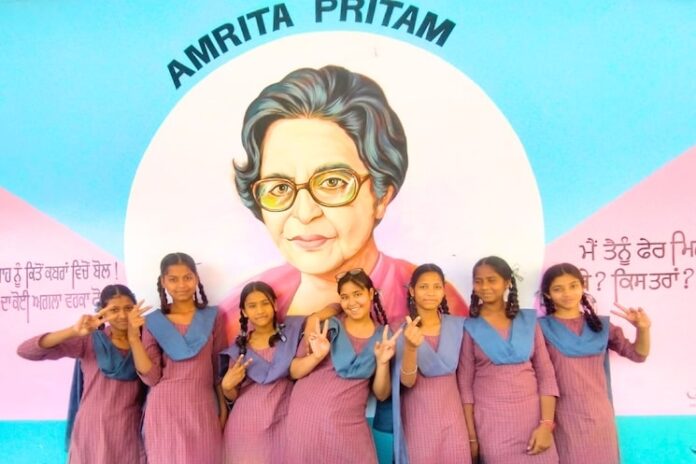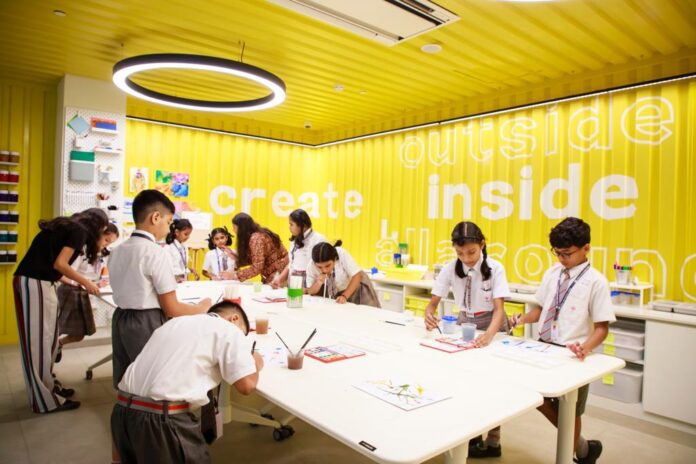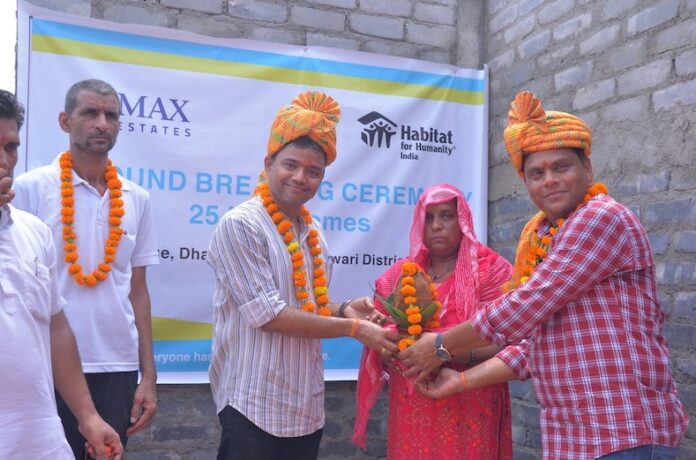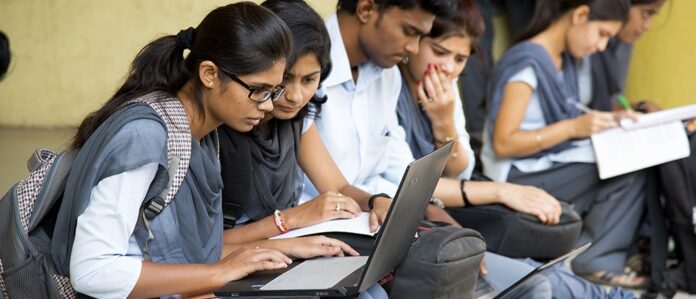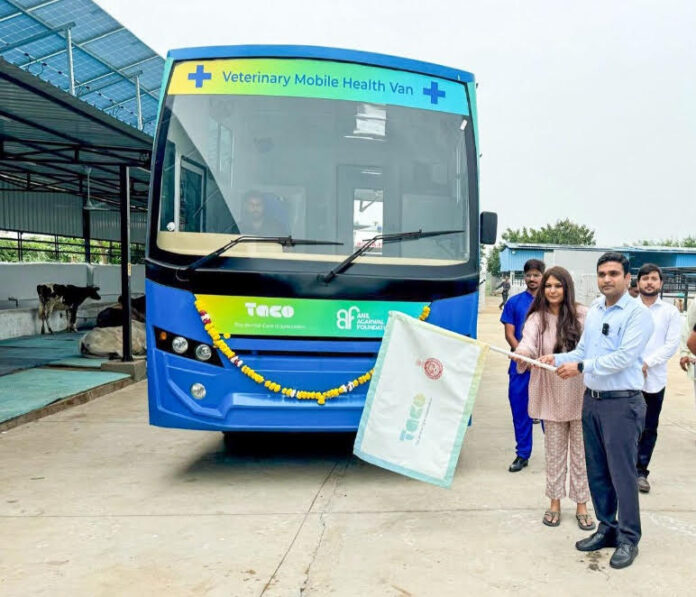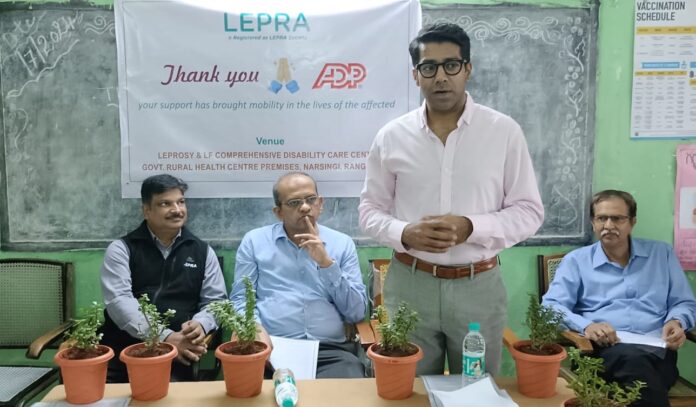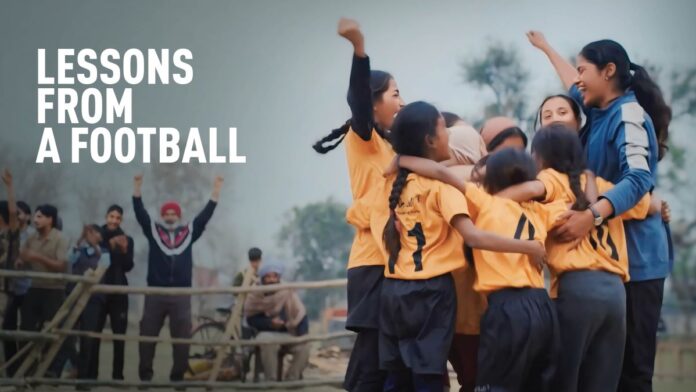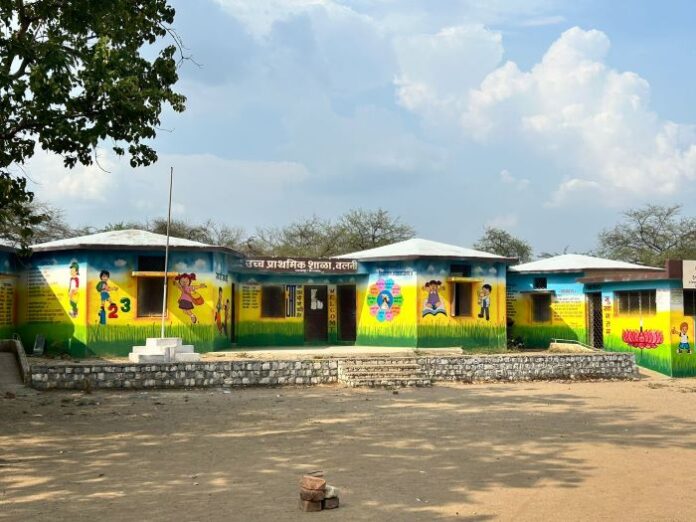CSR: Bank and Museum of Solutions sign partnership to jointly incubate Futuremakers programme
Standard Chartered Bank and Museum of Solutions, the unique children’s museum in Mumbai, have signed an agreement to jointly incubate the Futuremakers programme by enabling 100 city-based children from Brihanmumbai Municipal Corporation (BMC) schools to create a prototype of sustainable solutions for real world problems. Standard Chartered Bank, with a presence of over 165 years in India, and Museum of Solutions have roped in Teach for India as their support partner for this programme.
Through this joint programme, Museum of Solutions will conduct extensive workshops and training sessions to enable a group of 100 school children to explore skills such as critical thinking, problem solving, collaboration and leadership, which are essential to create a workforce necessary for dealing with the challenges of the future. These children will develop, build, and prototype new ideas to solve future challenges, while promoting a meaningful change within the community. It will aim to deliver two sets of focused skills to these students.
1. The first set of skills-sets will focus on Hydroponics, Composting & Kitchen Gardening, Automation, Fabric work and Hand prototyping.
2. The second set of skills imparted to the children will include Making a business plan, developing a campaign etc.
For the first cohort of the programme, which has commenced, the Museum of Solutions selected 50 students from Karamveer School, Sion, Anand Nagar Municipal School, Chembur, and Worli Sea Face Municipal School, Prabhadevi. The first cohort of prototype solutions for real-world problems, like water-related challenges, developments associated with sustainable food, and skill building sessions such as robotics, hand prototyping, and laser cutting design will be presented to industry leaders and investors in December 2024, and the second cohort of prototypes will be presented in March 2025.
Additionally, under this programme, the Bank will fund the visits of more than 15,000 Mumbai’s municipality school students to the Museum of Solutions during this academic year.
The Standard Chartered Bank and Museum of Solutions will jointly collaborate with BMC Education Department to ensure equitable access to the Museum for children from Municipality schools across Mumbai and Navi Mumbai.
According to Karuna Bhatia, Head Sustainability, Standard Chartered Bank and Global Business Services, India, “The Bank’s Futuremakers programme embodies its’ commitment to creating a brighter tomorrow for communities worldwide through strategic partnerships and investments in education and entrepreneurship, and a focus on sustainable development goals. Futuremakers by Standard Chartered empowers disadvantaged students by providing quality education and training opportunities to boost their technical, and soft skills. This specific programme will enable the BMC school children to gain a critical understanding of global and local issues surrounding sustainability. Based on this empowered knowledge, these children will ideate to create sustainable solutions for real world social and environmental problems. We are providing these children access to industry experts and structured knowledge to develop solution-building orientation in these children.”
According to Abhik Bhattacherji, Head Marketing, Museum of Solutions, “At MuSo, we aim to create a space for children to build knowledge and skills that can be applied in real-life situations to solve problems and drive positive change. The Futuremakers program will offer school children a platform to gain a deeper understanding of environmental and social issues, focusing on fostering a curiosity-driven and solution-oriented mindset. This program will enable children to comprehend key issues related to sustainable development and encourage them to create solutions that lead to a sustainable and more equitable future.”
Mumbai is home to about 2 million children from diverse backgrounds. The city has a wide network of primary, secondary, and higher secondary schools with over 1200 BMC run schools and about 300 private schools.
Futuremakers by Standard Chartered Bank is a global youth economic empowerment initiative, tackling inequality and promoting greater economic inclusion. Futuremakers supports disadvantaged young people aged 35 or below, to learn new skills. Focusing on three pillars – Education, Employability and Entrepreneurship – Futuremakers aims to help the next generation learn, earn, and grow.
Disclaimer: This media release is auto-generated. The CSR Journal is not responsible for the content.
CSR: Habitat for Humanity India and Max Estates join hands to build 50 homes in Haryana
Embarking on a transformative journey to empower communities at the bottom of the pyramid, leading housing non-profit organisation Habitat for Humanity India and Max Estates, a leading Real Estate developer in the NCR region, have forged a partnership to build 50 homes in Haryana. This collaboration represents a collective commitment to instil strength, stability, and self-reliance among families in dire need of decent shelter. The groundbreaking ceremony for this project was held on 27th July 2024 in Aakera village in Rewari.
Over the course of two years, the project will be carried out in two phases. Phase I will concentrate on the completion of 25 homes in Aakera village, while the subsequent Phase II will entail the construction of additional 25 houses in Bhudla village located in Rewari district of Haryana.
Anand Kumar Bolimera, National Director, Habitat for Humanity India said, “Safe and healthy housing is a basic need that is foundational to uphold human dignity and well-being. We are delighted to partner with Max Estates in this noble cause. This project is a testament to our ongoing commitment to empowering communities through sustainable housing solutions. We believe that every family deserves a decent place to live, and through this collaboration, we are taking a significant step towards making this vision a reality and building a brighter future for families in Aakera and Bhudla villages in Rewari district, Haryana. Our work is aligned with the Government of India’s vision of housing for all and with the United Nations Sustainable Development Goals especially Goal 11 that focuses on making cities and human settlements inclusive, safe, resilient, and sustainable.”
Sahil Vachani, Vice Chairman and MD, Max Estates Limited said, “As we embark on this transformative journey to uplift communities at the grassroots level, our partnership with Habitat for Humanity India exemplifies the core value of Sevabhav and our LiveWell philosophy at Max Estates. For every four homes sold at our Estate 128 project in Noida, Max Estates will support the construction of one home for an underprivileged family. This initiative embodies our commitment to make a real difference in people’s lives, and we are honoured to be a part of it. We eagerly anticipate the positive impact this partnership will bring as we join hands with the homeowners to create safer, more stable, and happier homes for all.”
Through the construction of adequate and decent shelter, this partnership aims to enable 50 future homeowners in Haryana build a foundation for their better future.
Disclaimer: This media release is auto-generated. The CSR Journal is not responsible for the content.
Building beyond Profits: Indian Real Estate’s Embrace of Corporate Social Responsibility
Corporate Social Responsibility (CSR) has evolved into a potent force for businesses to invest in and nurture a sustainable ecosystem that empowers future leaders in India. While the Government’s efforts are commendable, a collaborative approach is essential for ensuring global competitiveness, especially in the education sector. According to the NITI Ayog annual report, about 33% of CSR funds are directed towards educational goals, highlighting business’s significant role in this sector.
Indian real estate companies actively engage in CSR initiatives, particularly in this sector. Their initiatives focus on improving educational infrastructure, enhancing digital literacy, and supporting teacher growth and training. Projects such as smart classrooms, learning centres for the underprivileged, teacher training programs, and digital inclusion efforts, among other things, bridge learning gaps and empower students. These activities address challenges like outdated curricula, funding shortages, and inadequate facilities by funding new school constructions, renovating existing ones, and providing essential amenities like libraries, labs, and sports facilities.
Collaborations with non-profits, government bodies, and academic institutions are creating sustainable educational programs that prepare students for the future, foster innovation, and promote entrepreneurship, ultimately contributing to the development of the next generation of leaders in India.
Investing CSR funds in educational objectives yields several benefits
Empowerment of Education: By promoting education among individuals who lack financial resources, companies empower them to access educational opportunities, enabling them to break the cycle of poverty and enhance their life prospects.
Trust Building: Funding education through CSR initiatives helps build stronger relationships with communities, underlining a commitment to societal development that boosts brand reputation, and builds customer loyalty through corporate ethics.
Customisability: Educational programs and scholarships funded through CSR are highly adaptable, aligning with the organisation’s mission and vision. This flexibility allows companies to set specific criteria and adjust funding amounts to target the educational needs that resonate most with their strategic objectives.
Employee Loyalty: Educational scholarships provided by companies help cultivate a pool of talented individuals who may return as skilled employees. This investment in human capital brings loyalty and a long-term commitment to the company among beneficiaries.
Mentorship and Community Building: CSR initiatives enable beneficiaries to act as mentors, perpetuating a cycle of support and guidance within a scholarly community. This approach brings collaboration and knowledge exchange while also strengthening the social networks within educational sectors.
Economic Growth: Investing in education through CSR leads to the creation of a more skilled workforce, which attracts more investment and supports broader economic growth. This uplifts the overall economic environment by reducing unemployment and enhancing productivity.
Social Cohesion: Educational initiatives support social cohesion by empowering marginalised communities and reducing societal inequalities. By providing equal educational opportunities, CSR helps build a more inclusive society.
Long-term Impact: CSR investments in education have a long-term impact on society by creating a more educated population, reducing poverty, and promoting sustainable development goals.
Global Competitiveness: A well-educated workforce resulting from CSR investments, enhances India’s position on the global stage. Skilled professionals boost innovation and creativity, making the country a more attractive destination for international investment and collaboration.
Environmental Sustainability: Educational CSR initiatives often include elements of environmental stewardship, teaching students the importance of sustainable practices. This not only helps inculcate a sense of responsibility towards the environment but also promotes a greener future through educated choices.
In line with these benefits, various initiatives by real estate firms in India have demonstrated their commitment to CSR in the education sector, contributing significantly to community development and nurturing the future leaders of the nation. Their flagship initiative, focused on enhancing facilities and school supplies for children in Government Schools, has positively impacted thousands of students and exemplifies the real estate sector’s dedication to education and societal development. Through such initiatives, Indian real estate companies are building beyond profits, contributing significantly to CSR and community betterment.
Views of the author are personal and do not necessarily represent the website’s views.
 Mr. Pradeep Aggarwal is Founder & Chairman, Signature Global India Ltd. and Chairman, ASSOCHAM- National Council on Real Estate, Housing and Urban Development. His in-depth knowledge of various intricacies of securities market and financial services led him to diversify the arbitrage business. With a keen desire to do more, he ventured into the real estate business under the brand name ‘Signature Global’, focusing on Affordable Housing which is key to the growth of housing in India. With a grand vision and mission of ‘Har Pariwar Ek Ghar’ (A House for Every Family), Mr. Aggarwal has been contributing significantly to Prime Minister Narendra Modi’s flagship mission of ‘Housing for All’.
Mr. Pradeep Aggarwal is Founder & Chairman, Signature Global India Ltd. and Chairman, ASSOCHAM- National Council on Real Estate, Housing and Urban Development. His in-depth knowledge of various intricacies of securities market and financial services led him to diversify the arbitrage business. With a keen desire to do more, he ventured into the real estate business under the brand name ‘Signature Global’, focusing on Affordable Housing which is key to the growth of housing in India. With a grand vision and mission of ‘Har Pariwar Ek Ghar’ (A House for Every Family), Mr. Aggarwal has been contributing significantly to Prime Minister Narendra Modi’s flagship mission of ‘Housing for All’.
CSR: Registrations open for 9th edition of Ratti Chhatr Scholarship programme
New Delhi, India: Panasonic Life Solutions India, a diversified technology company, announced the ninth edition of its flagship scholarship program, Ratti Chhatr which aims to recognize and empower young future leaders by providing financial assistance to select undergraduate students admitted to B.E./B.Tech. courses at any Indian Institute of Technology (IIT), helping cover around 50-70% of their tuition fees. The registration for eligible students is open till 15th August 2024.
Pooja Garg Khan, Head of Corporate Communications and CSR, Panasonic Life Solutions India said, “At Panasonic, we believe that education is at the core of building leaders of tomorrow. Through our Ratti Chhatr initiative, we aim to encourage young minds with skills and learning that will equip them for a brighter future. Since the launch of the initiative in India, we have supported close to 240 students from underprivileged backgrounds to help them on their journey to realize their dreams. We also engage consistently with the scholars, in fact, one of them has recently joined our Innovation Center in Bangalore. This is a testament to the great results we can get when we create synergies between good talent and equal opportunities. We are now looking forward to the next batch of scholars.”
As a socially responsible company, Panasonic is committed to promoting inclusive growth and societal development. In line with this objective, Ratti Chhatr scholarship program in collaboration with the NGO partner Buddy4 Study, is committed to identify and support talented youth who have the potential to become future leaders of the country by providing equal opportunities and access to education for underprivileged students.
Disclaimer: This media release is auto-generated. The CSR Journal is not responsible for the content.
CSR: Veterinary Hospital with Animal Birth Control Unit & Mobile Health Van launched in Faridabad
Faridabad, India: The Animal Care Organization (TACO), a flagship animal welfare initiative by the Anil Agarwal Foundation, today inaugurated a Veterinary Hospital with an Animal Birth Control Unit, in its shelter in Faizupur Khadar, Faridabad (Haryana). The ceremony that was graced by the Deputy Commissioner of Faridabad, Shri. Vikram Singh, IAS, and Priya Agarwal Hebbar, Chairperson, Hindustan Zinc Ltd and Non-Executive Director, Vedanta Ltd, was also marked by the launch of a Mobile Health Van (MHV) to extend TACO’s reach beyond its immediate location in Faridabad.
Animals in need of surgeries or diagnostic tests will be able to receive prompt and comprehensive care without the need to be transported elsewhere, at the newly upgraded TACO facility spread across 2 acres. The Veterinary Hospital, ABC Unit and MHV are equipped with an Operating Theatre (OT) each. Five experienced veterinarians and surgeons have already been employed to diagnose and treat various medical conditions in animals, including complex and critical ones.
Talking about the significance of a well-equipped animal shelter, Priya Agarwal Hebbar, Chairperson, Hindustan Zinc Ltd, and Non-Executive Director, Vedanta Ltd. said, “TACO started its journey at this very shelter two years back and I am excited to witness the leap we have made by expanding its infrastructure and services significantly. While our hospital will greatly benefit the community members around, the MHV will travel door to door to attend to those emergency cases that require immediate attention. This facility will provide a range of essential medical services to animals in need, large or small, ensuring that the procedures and treatments are carried out with high standards of care and professionalism, thus creating a safer and a healthier environment for our beloved animals.”
Highlighting the efforts by TACO, Shri. Vikram Singh, Deputy Commissioner of Faridabad, said, “I commend The Animal Care Organization (TACO) for their remarkable efforts in supporting animal welfare in our community. The establishment of this animal shelter in Faizupur Khadar, Faridabad, complete with a veterinary hospital, an animal birth control unit, and a mobile health van, reflects their vision to do better and more for animal welfare. I believe that with compassionate projects like TACO, we can make significant strides in creating a more humane and responsible community for all living beings.”
The Veterinary Hospital has set up an in-house laboratory with advanced Biochemistry Machine & Hematology Analyzer that will enable the veterinarians with advanced diagnostics and tests.
Animal Birth Control (ABC) unit shall focus on controlling the population of stray animals through spaying and neutering programs. It comprises of seven sections including fully-air-conditioned wards for cats and dogs for their post-operative care and a kitchen to cater to their nutritional requirements.
The Mobile Health Van (MHV) shall provide door-to-door veterinary care including vaccinations and treatments to the needy strays as well as livestock and pet owners, within a radius of 20km of the shelter. It is equipped with two treatment tables for animal and best-in-class infrastructure, including hydraulic facility that would facilitate the provision of a raised platform for treatment of large animals. A doctor, a para-veterinarian and a veterinary assistant will travel with the MHV.
The newly inaugurated facility has several other key features added as well. An open shaded space will cater to the treatment of OPD cases, and three Travis have been installed to restrain large and aggressive animals and treat them with caution. While a dedicated mother-calf section has been created to cater to pregnant animals, in need of extra care, a section for blind animals has also been built to safeguard them from injuries. TACO facility cultivates fodder within its premises and its storage capacity has also been doubled. It has further employed a sustainable waste management technique through vermicomposting.
Earlier this month, AAF’s TACO signed a Memorandum of Understanding (MoU) with Animal Husbandry Department, Govt of Haryana and Haryana State CSR Trust by earmarking INR 100 crore for the upgradation of existing Government Veterinary Hospital in Kadipur, Gurugram into a 24×7 multi-speciality animal hospital and commence the construction of an animal birth control (ABC) unit, laboratory, pharmacy, training centre and shelter for extremely critical animals. This upcoming hospital in Gurugram along with the one in in Faridabad will equip Haryana state with two mega animal care facilities by TACO.
Notably, the TACO shelter in Faridabad is home to 160+ animals, including cows, bulls, and dogs, focusing on rescue, rehabilitation, advanced veterinary care and overall well-being. Since its inception in 2022, it has treated more than 60,000 animals through health camps held across several operational areas of Vedanta group, rescued almost 5,000 animals during the Delhi and Haryana floods, and supported over 460 members of farmer community through animal OPD services. The project has also gainfully employed over 20 locals at the animal shelter in the roles of animal handler, para vet, veterinary assistant and more. Furthermore, TACO’s dedication extends to education and training through the TACO Academy, which conducts sessions for veterinarians and paraprofessionals. TACO also supports and strengthens veterinary healthcare services through OPD and ambulance services.
Disclaimer: This media release is auto-generated. The CSR Journal is not responsible for the content.
CSR: Donation made to Leprosy Patients in Collaboration with the LEPRA Society
ADP India, a global leader in human capital management, takes a significant step towards supporting the health and well-being of individuals affected by leprosy. ADP proudly announced its collaboration with the LEPRA Society in a special initiative to donate specially designed footwear to leprosy patients. This event took place at the Rural Health Centre, Narsingi, Rangareddy, Telangana. These initiatives showcase the significant role ADP plays in social responsibility and its commitment to uplifting the communities it operates in.
In this spotlight, Mr. Sujnan Venkatesh, Senior Vice President and HR Head, ADP India said, “At ADP, we truly believe in lending a kind hand to the community and making a difference in people’s lives who need it the most. In this collaboration with LEPRA Society, we hope to support people affected with leprosy in ways that will help them live much more effortless lives. We chose this initiative as part of ADP India’s 25th anniversary celebrations under the company’s CSR Initiatives to support individuals in distress. Recognizing the multifaceted struggles faced by people living with leprosy and other disabilities, we are stepping up to ensure 300 patients affected by leprosy and lymphatic filariasis receive a pair of customized footwear each.”
The footwear distribution is part of ADP’s ongoing commitment to corporate social responsibility (CSR), highlighting its dedication to positively impacting the communities it serves. ADP has been actively engaged in its flagship CSR programs for the past few months. One of them was an extensive food donation campaign, wherein they donated 900,000 mid-day meals for one month to 37,000 children studying in government schools.
Additionally, ADP extended support to build a trauma care center and provide critical medical equipment and supplies, ensuring that the healthcare department can handle emergencies of accident victims. Furthermore, as part of the “Month of Caring” initiative, ADP employees engaged in events of volunteering to organize educational workshops, drives for cleanliness, grocery donation, and blood.
This donation was headed by Mr. Sujnan Venkatesh, Senior Vice President and HR Head, ADP India, Mr. Satyanarayana Vinjamoori, Vice President HR, ADP India, Mr. Sachidananda Aithal, Vice President – Global and India Finance ADP India, and Mr. George Mathews, Senior Director HR, ADP India. Other important delegates who witnessed this special occasion were from the LEPRA Society: Mr. Suresh, FRE, LEPRA; Mr. Kamesh, PO, LEPRA; Mr. M. Ramesh, President, Society for Leprosy Affected; Mr. Arun Kumar, Head-Programmes, LEPRA; Dr. Satya Ratna, Medical Officer, Govt. of Telangana; and Mr. Babu Rao, PT.
The footwear distribution event is yet another example of ADP’s efforts to contribute to the health and well-being of individuals affected by leprosy, providing them with the necessary resources to enhance their quality of life.
Disclaimer: This media release is auto-generated. The CSR Journal is not responsible for the content.
CSR: Campaign Combining Education and Sports for Girls Launched
New Delhi, India: The K.C. Mahindra Education Trust proudly announces the re-defined intervention from Project Nanhi Kali with an innovative campaign that integrates football into the curriculum for underprivileged schoolgirls across India. This campaign, created by Ogilvy, underscores the Trust’s commitment to holistic education, blending academic learning with essential life skills acquired through sports.
KC Mahindra Education Trust started Project Nanhi Kali to encourage and support underprivileged girls to complete 10 years of schooling. In alignment with the National Education Policy which advocates integration of sports as part of the curriculum Project Nanhi Kali is introducing the girls to the game of football.
Project Nanhi Kali’s campaign film captures the transformative power of football on young girls, highlighting real-life stories of schoolgirls from across India who are part of this program. These girls are not just learning to play football; they are gaining confidence, leadership skills, and a sense of self-worth that transcends the football field. The film is a testament to how sports can be a powerful vehicle for change, teaching values such as teamwork, perseverance, and resilience.
Project Nanhi Kali has transformed the lives of more than 700,000 girls across India.
Commenting on the new film, Sheetal Mehta, Trustee and Executive Director, K.C. Mahindra Education Trust says, “At Project Nanhi Kali, we empower underprivileged girls through a transformative blend of education including 21st-century skills and sports leadership training. This holistic approach provides the girls with the essential tools to succeed in life. Our ‘Lessons from a Football’ film vividly showcases how football teaches crucial values like teamwork, leadership, and perseverance. By incorporating sports into our program, we see Nanhi Kalis evolving into strong, confident leaders who are ready to take on the world.”
Asha Kharga, Chief Customer and Brand Officer, Mahindra Group also added, “Nanhi Kali represents Mahindra’s philosophy of Rise in action. We approached the new campaign with the mindset of an innovation launch. In alignment with the National Education Policy, Nanhi Kali has revamped its curriculum to be more holistic by integrating sports, while maintaining a focus on English, Math, Digital & Financial Literacy, and Soft Skills.“
“We needed to effectively communicate this shift and a day with the Nanhi Kalis in the village of Jambusar gave us rich insights. For these girls, football is more than a sport, it instills in them the confidence to Rise.”
Ogilvy India conceptualised this thought-provoking film. Kainaz Karmakar and Harshad Rajadhyaksha, Chief Creative Officers of Ogilvy India opined: “We visited a rural Nanhi Kali centre and spent a lot of quality time interacting with several Nanhi Kalis, and their coaches. The raw, captivating, and liberating stories of what the simple game of football has come to mean for these little girls and their sense of confidence and self-worth, is what inspired us to create this piece of communication.
“It is a privilege and honour for all of us at Ogilvy to partner with the super-driven Nanhi Kali client team in this journey. We are also very pleased with what our director, Afshan, has been able to bring to life in this film, working with so many amazing actual Nanhi Kalis who had never ever faced a movie camera in their lives, before this film.”
Disclaimer: This media release is auto-generated. The CSR Journal is not responsible for the content.
CSR: Ambuja Cements revolutionises rural education by revamping 4 schools in Nagpur District
Nagpur, India: Ambuja Cements, the cement and building material company of the diversified Adani Portfolio, is committed to empowering students with high quality education. Through CSR efforts, it has successfully revamped four schools of Kalameshwar & Nagpur Gramin block of Nagpur district. Transforming Zilla Parishad (ZP) schools by integrating various subjects with visual arts, it fosters a holistic development environment for students, which has inspired six more schools in the region to request for the initiative at their campuses.
The project by the CSR arm of Ambuja Cements recognises the transformative power of art in education. Starting with the Tondakhairi ZP school of Kalameshwar block it has integrated art into the curriculum, making learning more engaging and comprehensive for students. In classrooms, Building as Learning Aid (BaLA) murals bring subjects including mathematics, science, and geography to life, while environment-themed exhibitions and soil painting activities deepen students’ understanding of these subjects.
The project also establishes school arts councils, giving students a platform to explore their artistic interests. Workshops led by successful alumni from the community further inspire students to pursue their passions. This initiative doesn’t just stop at the classroom door either. It expands into the community by transforming blank walls into vibrant artworks, fostering a sense of pride and ownership among students and residents alike.
This initiative has opened new pathways for students, encouraging them to discover and nurture their artistic talents, and motivating them to consider further education and careers in the arts. The project’s success has attracted steady funding from local businesses and former students, enabling it to expand into digital arts, sculpture, and other visual mediums.
Inspired by the success at Tondakhairi ZP school, other village schools have followed suit, contributing to the initiative and adopting similar techniques. Currently, four schools have implemented the initiative, benefiting 212 students, with six more schools already eager to join.
Ambuja Cements remains steadfast in enabling high quality education for all by nurturing a culture of creativity, cooperation, and pride. This success story demonstrates how such initiatives can uplift entire communities and cater to the evolving educational needs of future generations.
Disclaimer: This media release is auto-generated. The CSR Journal is not responsible for the content.

